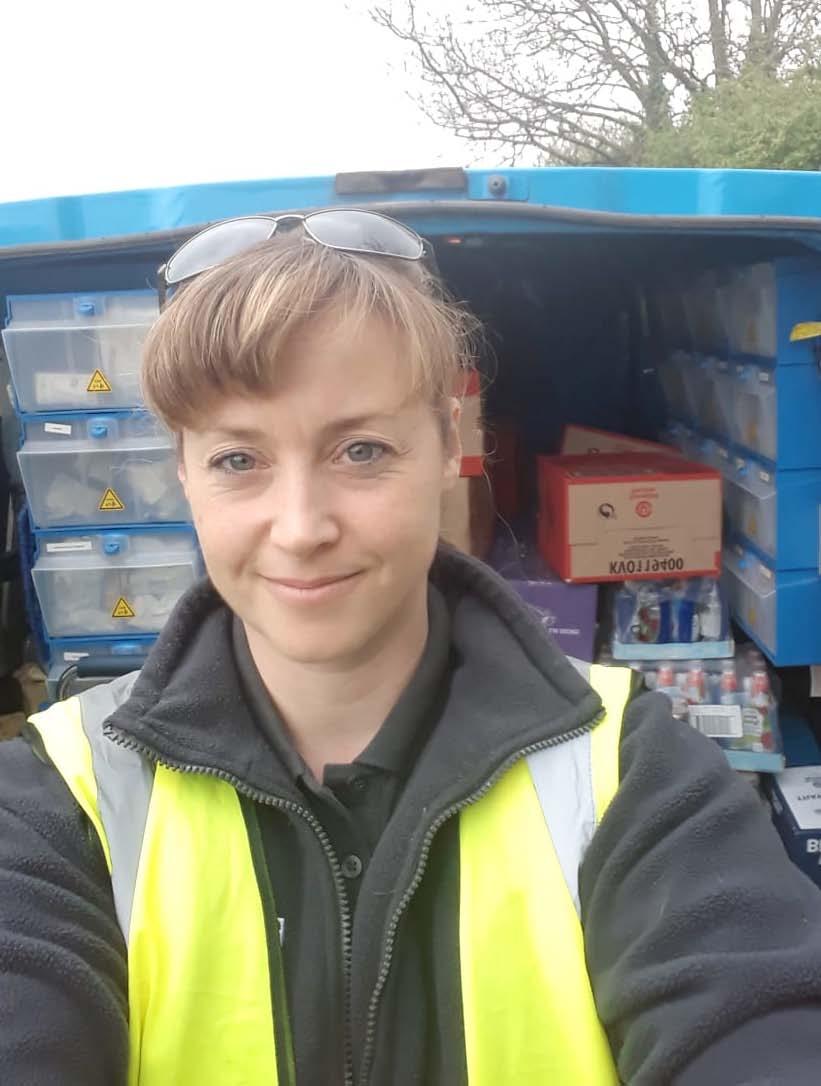
7 minute read
Key Worker Real Life
RealLife
Keyworkers
Advertisement
Flags, banners, pictures and posters emblazoned with rainbows and messages of thanks were proudly displayed in windows, gardens, along roadsides, and on clothing, to name but a few. Along with a weekly Thursday night clap for critical workers, when we banged on saucepans, blew whistles, and made as much noise as we could, they gave us a chance to show our genuine gratitude to the keyworkers. These were the 10 million or so UK workers who were on the frontline – keeping the country going during the COVID crisis. Health and social care workers, supermarket staff, transport and food industry workers, school and nursery staff were all included in this list of workers crucial to helping our new daily lives continue. And during the uncertainty of the pandemic, one thing did become clear – those who tended to be in the lower wage brackets were the ones most needed during the outbreak.
Back towards the beginning of March, we watched in utter bemusement and horror as shoppers cleared store shelves by bulk buying and stock piling. And here’s a startling statistic – according to convenience store manager Rachel Brown, on the Monday before Lockdown, she sold 110 four-packs of toilet roll in just six hours. That equates to more than one toilet roll purchased per minute! And at one point, sales of milk virtually tripled! To keep up with customers’ increased shopping needs, Rachel saw her working week increase rapidly too. She went from working a weekly minimum of 40 to 45 paid hours, to a minimum of 45 to 50 paid hours to keep up with demand. On top of this, Rachel lent a hand to a COVID support group, to help collect shopping and prescriptions and so on for those who were not able to go out and about, and spent her days off trying to find educational activities to enjoy with her young family.
Rachel and her team at the shop pulled out all the stops to ensure it was business as usual, but she remains modest, and said, ‘I was just going to work and doing my job. I really wasn’t doing anything special.’
But as coronavirus, and trying to prevent its spread, gripped hold of the nation, Rachel’s job began to look very different. She told us, ‘as a store, we used approximately 50 more staff hours a week to try and keep up, and manage social distancing in store.
‘We noticed the panic buying about a week and a half before Lockdown. By the time Lockdown started, our shelves were pretty empty. The supply of fresh food recovered quite quickly, and milk would have been fine too, if people had shopped sensibly. But on the Monday when Lockdown was announced, we sold 220 2-litre cartons of semiskimmed milk, compared to a normal Monday, when I would have sold 80!’
Despite best efforts, other food staples were also hard to get hold of. Rachel told us, ‘the week before Lockdown, bread supply was poor because of increased demand. Fortunately, on the first Monday that schools were closed we were able to supply the local school with bread, and also a care home across the road from our shop.
‘As soon as it was announced pubs would close, that evening beer sales went crazy!
‘Ambient goods took a lot longer to return. For about three months, getting flour was really difficult, and baking products in general were in short supply, including caster sugar, icing sugar and baking powder.
‘Cereal was also a big problem, as more people were at home for breakfast.’
As you would expect, Rachel and her team saw many more customers through their doors as panic buying hit. But as the situation calmed down, so did the number of shoppers – although Rachel explained that the amount customers were spending per visit increased.
And although we will always have memories of the images of empty shelves, and of having to eat what had been sitting at the back of our cupboards while we waited for things to get a little more back to normal, we will always remember how people pulled together as well. And Rachel emphasised this too, saying, ‘I noticed a lot of people shopping for others, which was really nice to see.’
Grateful customers and heartwarming responses to her hard work
filled the days of Tori Callaby, a White Goods Engineer with British Gas. Alongside making vital repairs to clients’ crucial appliances, Tori delivered much needed supplies to a local foodbank, and she also adopted a dog during Lockdown – Brutus the pandemic pooch!
As with so many of our marvellous key workers, Tori remains modest. She told us she felt lucky to be able to continue doing her job throughout Lockdown, and also felt extremely well supported by her employers, as well as fortunate to feel such a sense of camaraderie with other workers still out and about.
Tori said, ‘when I was driving to jobs, the traffic was light, there were no queues, and a lot of the time on major roads between towns it would just be me and the trucks. Lots of us drivers were waving - at ambulances and other emergency services, and to each other. I took to waving at a lot of trucks too – I felt that we were all in this together, after all.’
Tori told us, ‘at first I didn’t feel like I was deserving of thanks and praise as a key worker. It felt like what our NHS heroes were doing was so much harder and more worthy of gratitude. But one day a courier spoke to me after leaving a parcel at a nearby house. He wound down his window and said ‘thank you’ to me. He told me I was really brave for actually going into people’s houses, compared to him just having to go to the door, which worried him enough. He said he was going to clap for me too at the next Thursday evening clap. It was heart-warming to hear, and really brought the situation home. But continuing to do my job just felt normal to me. We are there for our customers no matter what.
‘It’s fair to say my customers thanked me ten times more than usual too!’
Under normal circumstances, Tori’s job involves dealing with breakdowns of all white goods. She explained, ‘throughout Lockdown we kept going, but our work was scaled back to dealing with complete breakdowns only of washing machines, refrigeration and cooking appliances, but only where there was no suitable alternative available.
‘When Lockdown came into force, with the limited amount of work, a lot of us were sat at home feeling frustrated at not being more useful. We approached the company about how we could volunteer and be a force for good, and help our communities. So British Gas set up a relationship with The Trussell Trust, an organisation that supports food banks all over the country. We worked with them to collect bulk quantities of food, provided by supermarkets and producers, from central hubs, in our larger vans, and distributed it back to our local food banks. It was then divided up into household size parcels, and our smaller vans delivered these to the community.’
Tori added, ‘I have a large van, so I took part in the bulk collections and delivered them to a foodbank in Wisbech several times. This was really rewarding because I felt useful, I knew I was helping people, and it was quite fun too!’
As life returned to normal little by little, Tori and her husband Rob welcomed a furry friend into their lives – Brutus the Staffordshire Bull Terrier!
‘We had been looking at adopting a dog for over a year,’ Tori said. ‘Then Lockdown happened and charities stopped rehoming. I kept an eye on their websites though, and as it started to ease I eventually came across Brutus.’
He is now happily settled at the couple’s home in Sutterton. ‘He loves cuddles and playing with his tennis ball,’ Tori laughed. ‘He goes nuts for the hose, which is hilarious! He just wants to play with everybody!’
Tori loves her job, and seeing Brutus when she comes home from work makes her day. ‘He’s our little ray of sunshine!’ she smiled.







